| Srl | Item |
| 1 |
ID:
138249
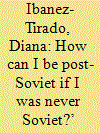

|
|
|
|
|
| Summary/Abstract |
Based on anthropological fieldwork conducted in the Kulob region of southern Tajikistan, this paper examines the extent to which the existing periodization ‘Soviet/post-Soviet’ is still valid to frame scholarly works concerning Central Asia. It does so through an analysis of ‘alternative temporalities’ conveyed by Kulob residents to the author. These alternative temporalities are fashioned in especially clear ways in a relationship to the physical transformations occurring to two types of housing, namely flats in building blocks and detached houses. Without arguing that the categories ‘Soviet’ and ‘post-Soviet’ have become futile, the author advocates that the uncritically use of Soviet/post-Soviet has the unwanted effect of shaping the Central Asian region as a temporalized and specialized ‘other’.
|
|
|
|
|
|
|
|
|
|
|
|
|
|
|
|
| 2 |
ID:
101178
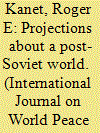

|
|
|
| 3 |
ID:
100395
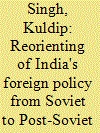

|
|
|
| 4 |
ID:
084439
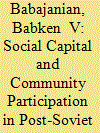

|
|
|
|
|
| Publication |
2008.
|
| Summary/Abstract |
This article argues that the social capital framework used by development agencies in community-driven development projects in post-Soviet countries may not be adequate for analysing conditions affecting community participation. Research in Armenia shows that the availability of social capital in a community may not necessarily translate into participation. The governance environment plays a key role in affecting the nature and forms of community participation and in shaping local institutions in Armenia. The research argues against the 'cultural' view of institutional change, which presumes that the main barriers to participation are posed by cultural factors, such as interpersonal trust and the 'mentality' of post-Soviet citizens. Development interventions that focus on building social capital as a means to promote community participation may not be effective without addressing broader structural factors affecting participation
|
|
|
|
|
|
|
|
|
|
|
|
|
|
|
|
| 5 |
ID:
140448
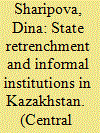

|
|
|
|
|
| Summary/Abstract |
Despite government efforts, post-independence Kazakhstan has largely failed to provide high-quality medical services to its population. State retrenchment in the public healthcare system has led to the deterioration of medical service delivery. It has provided incentives for people to widely use informal reciprocal exchanges – personal connections and informal monetary and non-monetary payments – to gain access to better medical care. In contrast to the existing explanations focusing mostly on the cultural origin of the continuity of informal exchanges, I argue that state retrenchment from the social sphere and under-provision of state goods and services have perpetuated informal exchanges in post-Soviet Kazakhstan. Despite similarities in informal practices between Soviet and post-independence Kazakhstan, some important differences in terms of scope and the nature of informal exchanges are observed. This article draws on data collected from interviews, textual analysis, and original surveys of people's attitudes towards the healthcare system and informal help conducted in Kazakhstan in 2011 and 2013.
|
|
|
|
|
|
|
|
|
|
|
|
|
|
|
|
| 6 |
ID:
120372


|
|
|
|
|
| Publication |
2013.
|
| Summary/Abstract |
This paper examines the state-building project in Kazakhstan since independence in 1991. It argues that both civic and ethno-nationalistic tendencies in state-building can be identified but that it is not any particular trajectory of nationalism in Kazakhstan that is of significance so much as the tensions between two very different trajectories. We argue that, at least to date, the government has succeeded in managing these tensions quite effectively both at the policy level and in its relations with different ethnic groups and neighbouring states. Whether Kazakhstan can continue to manage these tensions in the post-Nazarbayev era is one of the most significant questions facing the country.
|
|
|
|
|
|
|
|
|
|
|
|
|
|
|
|